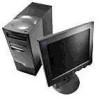IBM 6868 User Guide - Page 48
Updating system programs, Managing your computer
 |
UPC - 087944494911
View all IBM 6868 manuals
Add to My Manuals
Save this manual to your list of manuals |
Page 48 highlights
Updating system programs System programs are the basic layer of software built into your computer. They include the power-on self-test (POST), the basic input/output system (BIOS) code, and the Configuration/Setup utility program. POST is a set of tests and procedures performed each time you turn on your computer. BIOS is a layer of software that translates instructions from other layers of software into electrical signals that the computer hardware can understand. The Configuration/Setup utility program enables you to view and change some of the settings in the BIOS. System programs are stored in an electrically erasable programmable read-only memory (EEPROM) module on the system board. This is also sometimes referred to as flash memory. IBM occasionally makes changes and enhancements to the system programs. When updates are released, they are made available as downloadable files from the World Wide Web (see Chapter 7, "Getting help, service, and information" on page 127). System programs are updated by starting your computer with a flash update diskette in the diskette drive or by using the Remote Administration feature. Instructions for using system programs updates are included in a README file provided with the downloadable files. See "Setting Remote Administration" on page 54 for more information. Managing your computer Your computer comes with features that a network administrator or file server can use to remotely manage and control your computer. For more information about system management, see Understanding Your Computer (provided on the IBM Software Selections CD that comes with your computer). IBM Universal Manageability Services (UM Services) streamline and automate PC systems management and support tasks, such as asset deployment and tracking. These PC tools are available for IBM PCs at no additional charge, helping to reduce total cost of ownership of your networked PCs so that you can focus vital company resources on essential business activities. Go to http://www.ibm/pc/us/software/sysmgmt/ on the World wide Web and select Products for more information about available system management programs. 34 IntelliStation User Guide















